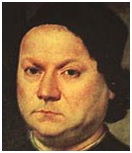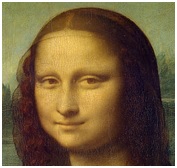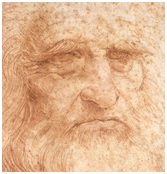|
 |
|
 |
Leonardo da Vinci - Creativity and Art
Leonardo da Vinci (1452-1519)
Italian painter, sculptor, architect and engineer from Vinci, Tuscany (pictured right). A big rival of Michelangelo (pictured right below).
His most famous paintings are...
Why was he so creative?
1. Curiosity and experimentation His motto was saper vedere (“knowing how to see”). So he:
He was incredibly curious and brilliant at experimentation.
2. Learning and self-discipline He never stopped learning, because he loved it so much. He learned from:
Leonardo believed that:
3. Creative imagination Leonardo is famous for the imagination and feeling he put into his work. He thought that an artist should draw not only people but also their feelings (e.g. Mona Lisa’s smile, pictured right).
4. Challenging goals He always gave himself really difficult things to do. 5. Communicator Leonardo (pictured right in a self-portrait) believed in clear and creative communication. His vocabulary was great and vivid, but he believed that drawing was a much more powerful communicator than writing.
6. Variety He had two careers as an artist/sculptor and scientist/engineer, and his work in one helped his creativity in the other. He loved doing new and different things to broaden his experience.
7. Leisure Leonardo:
8. Concentration and hard work He was totally absorbed in his work, balancing thought and action. Some days he painted the Last Supper (1495-8), pictured right, from dawn until dusk. Other times he would just stare at it for three or four days, trying to find faults in what he had painted.
9. Customer satisfaction He painted pictures for others to admire, and his new machines (like an improved printing press) were always more efficient and easier to use.
10. Energy His love of learning and creativity gave him boundless energy and enthusiasm.
Key quotes on learning and wisdom Iron rusts from disuse...so does inaction sap the vigour of the mind. Wisdom is the daughter of experience.
Key quote on the learning organization He who thinks little, errs much.
Key quote on education and training Study without a liking for it spoils the memory.
Key quotes on success Every obstacle yields to stern resolve. Being willing is not enough; we must do. One can have no smaller or greater mastery than mastery of oneself.
Key quote on the past, present and future Be not false about the past.
Key quote on death As a well spent day brings happy sleep, so a life well spent brings happy death.
Key quote on innovation If it works big, others quickly copy it. Then you do something else. The trick is the doing something else.
Key quote on design Simplicity is the ultimate sophistication. |
|
|
||
|
|
|
||
|
||
| Copyright © wisdomtowin.com All Rights Reserved | ||
|







